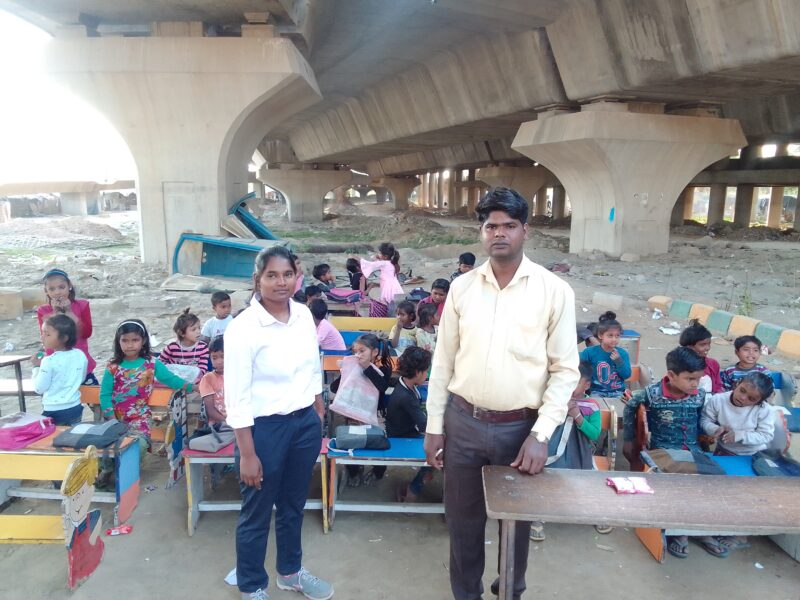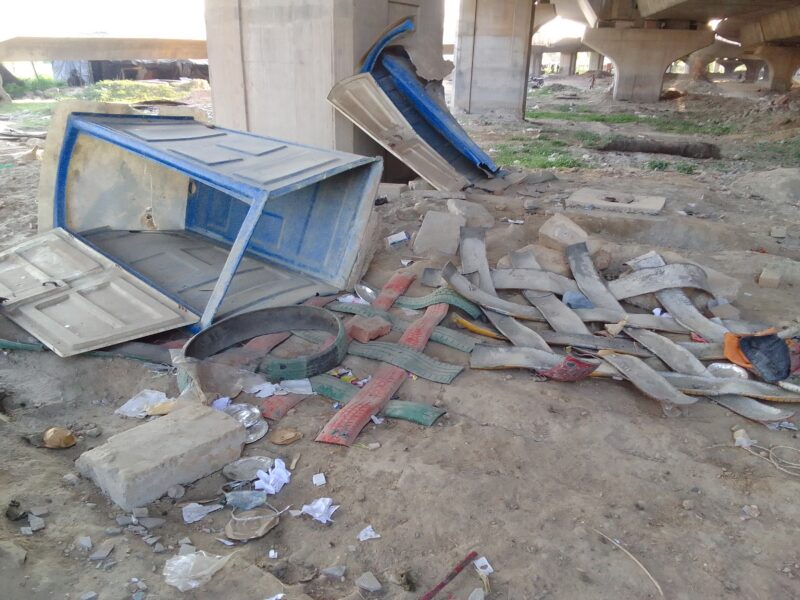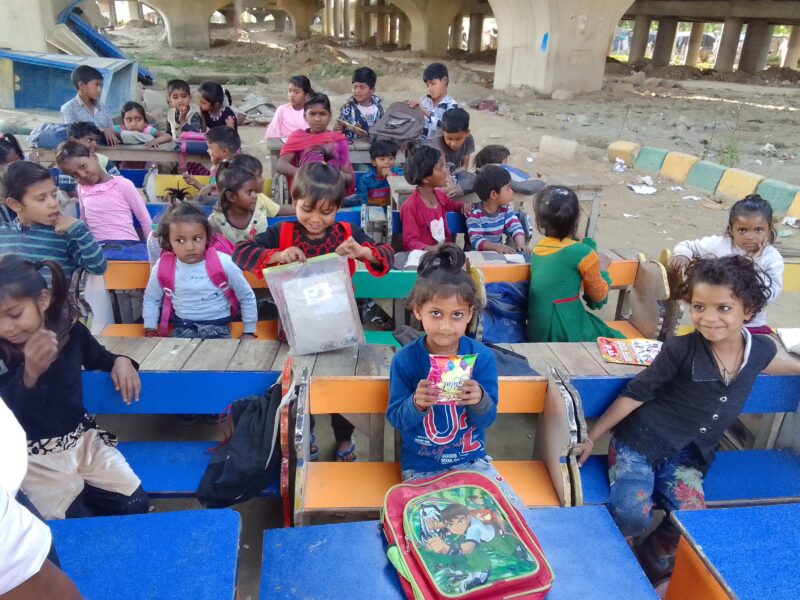A makeshift school named Vanpool Pathshala, which was demolished by the Public Works Department (PWD) on January 11 this year, has been restarted.
The school, located under a flyover in east Delhi’s Mayur Viharphase-I, has been providing free education to underprivileged children for the past few years. Despite PWD removing some fixed properties from the premises, the
school is functioning again, and classes from nursery to class 10 are running with full enthusiasm.
While classes were held between 8 am and 2 pm in two batches before the demolition, they have switched to evening and are held from 3 to 5 pm now.

weather lab in September 2022.
“It took us over 3 years to build this school but all was crushed in a moment. Aise samjho ek toofan aaya aur sab kucchh ujad gaya (It is as if a storm has destroyed everything that we built). They even destroyed plants and cut a challanfor the handpump,” Vikram, a teacher, toldPatriot.
The tuition-cum-vocational studies centre was started by Vikram, a Hindi graduate from Delhi University, along with his brothers after the lockdown in 2020. As the number of students grew, other good Samaritans chipped in.
Vikram, who hails from Badaun district in Uttar Pradesh, narrates the ordeal on the day of demolition.

“The authorities didn’t give us any time or notice. On the evening of January 10, two cops warned us about the demolition and asked us to remove the school by the next day. On January 11, a few officers from the PWD came with a dozen police personnel and destroyed it. They said that we were carrying out illegal commercial activity. We saved whatever we could.
“Earlier, when the construction of the flyover was in full swing, the officers of L&T (Larsen & Toubro) did not stop it. They even gave us 20-25 trucks of soil to help us construct this school. That time, the police did not stop or warn us, which they normally do in cases of illegal encroachment,” he adds.
Vikram informs that the school was the largest education centre for children living in slums. The libraries of the school source electricity from solar panels and the school has collaborated with medical companies for Covid-19 centres.
“One of the two libraries, which was supposed to be inaugurated in a few days, was also destroyed in the demolition drive. It will take time to fully reconstruct it,” Vikram said.
Vikram came to Delhi in 2013 and started teaching children with his elder brother for free. However, as lockdown hit the country, the lack of smartphones led him to start the school.
“Most of the children who study here come from families of labourers and farmers who cannot afford expensive gadgets. Electricity and network were also big problems.So, we thought, ‘Why not teach them?’” he says as he explains how he started the school.

“We started this centre under this flyover [in Yamuna Khadar, Mayur Vihar phase -1] in July 2020 with five children and taught them on charpoys. At the time of demolition, nearly 300 children from neighbouring slums were attendingit after their regular school. Students from class one to 12 attended sessions here,” he adds.
The school also employed children who had studied there.
“Initially, we took no fee. But when students started to grow, we needed teachers. So, some students who used to study here started teaching. We started a fee of Rs 200 – Rs 250 because we wanted to pay our 12 teachers, who were also graduate students,” explains Vikram.
Not only tuition, the school would also set up awareness programmes, health camps, and counselling sessions for those dropping out.
“It wasn’t just a school. It was a community centre. We also helped students who could not continue regular education to learn from SOL (School of Open Learning),” adds Vikram.
This school received special attention last year when Microsoft president Brad Smith and actor-comedian Trevor Noah inaugurated the weather lab here in September. Some NGO came for help too.
“We had special computer classes and library sessions too. We used to impart vocational training classes for skill development. This included painting, sewing, and computer classes. We also had computers given to us by Jeevan Stambh Foundation. We had solar panels powering the fans. It was a sustainable model. Playground and fun activities were also sponsored by a courier company. While many of the books and uniforms were given to us by charity organisations, others we bought from our pockets. Karma Foundation helped with the furniture and the toilets were donated by Andhra Foundation. It was worth Rs 16-18 lakh,” says Vikram.
In addition to Vikram and his siblings Naresh and Urmila, other teachers too took classes before the demolition.
However, after the demolition, only Vikram and Urmila can be seen teaching the students.
Urmila, 19, who is pursuing graduation from Maharaja Agrasen College, University of Delhi, has been teaching here since 2021.
“I started teaching here aftermy twelfth standard. I love teaching and can’t think of anything else,” she remarks.
She remembers the day when school was demolished.

“The children gathered here early in the morning and were weeping. After the demolition, we were uncertain about how we would restart it. Some teachers also left as students left. We were reduced to zero. Aise samjho jaise jaise ghar main kisi 18 saal ke bacche ki maut ho jae (It was as if a young kid had died). But we collected students again and restarted. Some children carry taat (wooden plank) from home and sit on it,” she says.
One of the students at the centre, Suhani Saxena, 15, tellsPatriot, “When this school was destroyed, I was devastated. Bhayya (Vikram) teaches us very well and supports us too. My parents could never afford a stationery box and books. So, bhayya financed my course and dress.”
The class 9 student is currently studying in a government school.
“My father is a heart patient, so he is unable to work. After the lockdown, when we were unable to pay room rent, we left our house, and stayed at this school,” Saxena reflects.
Vikram provided free books, stationery, school bags, and dresses to the students before the school was destroyed.
Another class 9 student, Rukhsar Ansari, whose father is an e-rickshaw driver, says, “Bhaiyya made this centre very beautiful. It was our collective work because we also helped in painting the walls. When this broke, we were upset. However, after a short break, bhaiyya started to teach us again and encouraged us to work hard.”
Vikram loves his students and is hopeful of the future. He is himself preparing for TGT/PGT exams and also works as a researcher. Despite the busy schedule, he continues to teach.
“The NGOs who supported us were also shocked. Ye to corona se bhi jyada bhayankar bimari aa gayi (This demolition was more dangerous than Covid-19 for us). It happened under the vigilance of the education minister of Delhi. It was painful to see the school being destroyed. But we will continue to teach,” he remarks.





